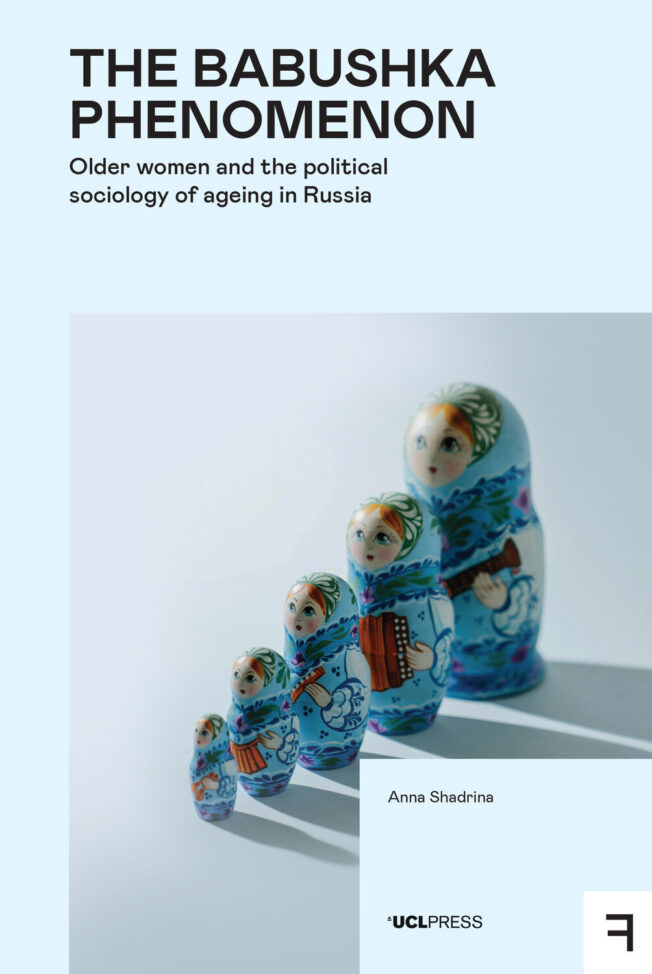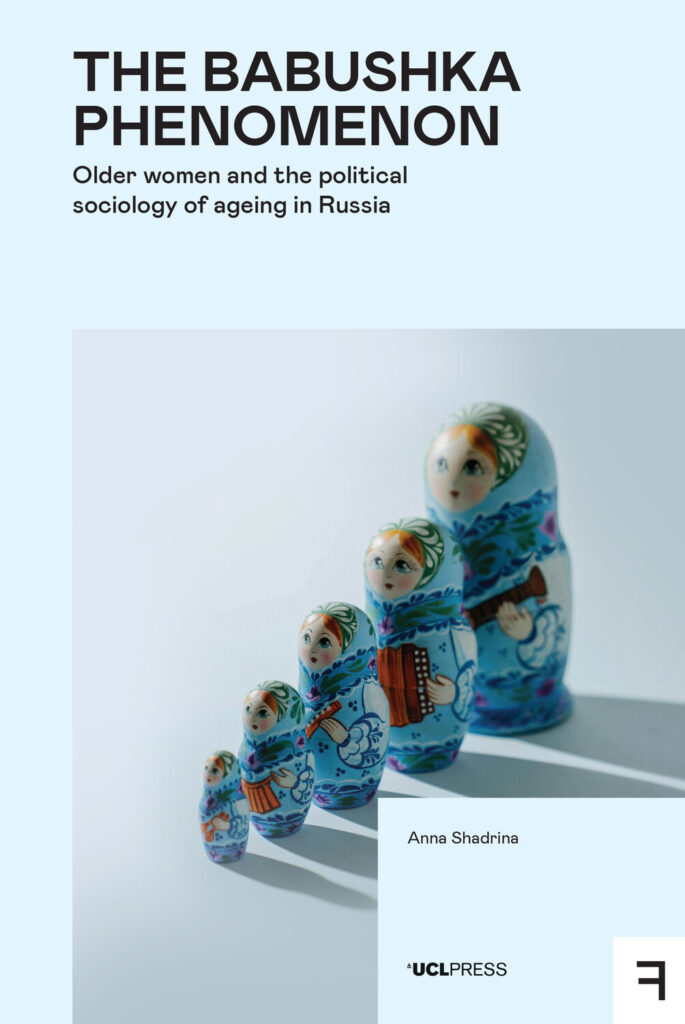
The Babushka Phenomenon
Older women and the political sociology of ageing in Russia
Anna Shadrina (Author)
Series: FRINGE
The Babushka Phenomenon examines the social production of ageing in post-Soviet Russia, highlighting the role of grandmothers as primary caregivers due to men’s traditional estrangement from family life. This expectation places grandmothers, or babushkas, in a position where they prioritise childcare and housework over their careers, making them unpaid family carers reliant on the state and their children.
Anna Shadrina situates older Russian women’s experiences within the post-Soviet redefinition of the nation, analysing their portrayal in popular media and biographical narratives of women aged 60 and over in Russia and the UK. It addresses class and racial disparities, noting how some women outsource family duties to less qualified women, and emphasises age as a significant but overlooked axis of social inequality. From a feminist perspective, the book explores citizenship as both a status and a practice of inclusion and exclusion. By focusing on older women’s rights to participate in private and public spheres, it discusses the new social inequalities that emerged after the USSR’s collapse. Despite prioritising others’ interests, older Russian women actively engage in economic citizenship, though their struggles for recognition are often excluded from formal economy and politics.
Series editors’ preface
Preface
Acknowledgements
Introduction. How Russians procreate, grow older and die
1 The babushka phenomenon
2 ‘Monstrous’ grandmothers in Russian culture
3 How to be a good grandmother
4 Financial independence past pensionable age
5 Community bonds
6 Love and sex in later life
7 Epilogue. Older women making sense of Russia’s politics
Conclusion
References
Filmography
Index
DOI: 10.14324/111.9781800089099
Publication date: 01 October 2025
PDF ISBN: 9781800089099
EPUB ISBN: 9781800089105
Hardback ISBN: 9781800089075
Paperback ISBN: 9781800089082
Anna Shadrina (Author) 
Anna Shadrina is Lecturer in Sociology in the Department of Sociology, Social Policy, and Criminology at the University of Liverpool. She received her PhD in Sociology from Birkbeck, University of London and was a Leverhulme Early Career Fellow at the UCL School of Slavonic and East European Studies from 2021 to 2024. Her previous two monographs (published in Russian) explore the transformation of conventional heterosexual family life in Russia, Belarus and Ukraine.
‘The Babushka Phenomenon offers a nuanced and insightful approach to gendered aging in the Soviet post-socialist context. While older women are often overlooked in research, this is especially the case in societies undergoing rapid social, political, and cultural transformation. By listening to the stories of this seemingly “unimportant” group, Anna Shadrina uncovers their “invisible” labour and selfhood through an intersectional lens of gender, age and class. This book will be of particular interest to readers engaged with questions of post-socialist gender hierarchies, care and citizenship’.
Yulia Gradskova, Associate Professor, Södertörn University, Stockholm
‘This powerful and moving book opens a lid on a trope little known to western sociologists and gerontologists: that of the Russian Babushka. Anna Shadrina takes us on a fascinating journey, via accounts of Soviet and post-Soviet history, culture, films and the lived experience of a large and diverse caste of older women themselves, into the paradoxical norms and expectations associated with this role. Shadrina explores babushkas as grandmothers, mothers and daughters, neighbours, citizens, workers and sexual subjects, among other things, and demonstrates the ways social change not only impacts on the most vulnerable members of a society but is underpinned by a solid and enduring stratum of sexism and ageism. In this highly readable work, Shadrina makes a theoretically rich, and exquisitely sensitive contribution to a more global sociology of ageing and gender.’
Susan Pickard, University of Liverpool
Postdigital Intimacies
Adrienne Evans, Jamie Hakim, Jessica Ringrose, Amy Shields Dobson, Shaka McGlotten,
16 March 2026
The Chronopolitics of Life
Nolwenn Bühler, Nils Graber, Victoria Boydell, Cinzia Greco,
04 December 2025
Evaluating Anti-Trafficking Interventions
Ella Cockbain, Aiden Sidebottom, Sheldon X. Zhang,
18 November 2025
The Faces of Authoritarianism and Strategies of Dissent in Contemporary Brazil
Andreza Aruska de Souza Santos, Katerina Hatzikidi,
15 May 2025
Revisiting Childhood Resilience Through Marginalised and Displaced Voices
Wendy Sims-Schouten,
11 February 2025
The Babushka Phenomenon
Older women and the political sociology of ageing in Russia
The Babushka Phenomenon examines the social production of ageing in post-Soviet Russia, highlighting the role of grandmothers as primary caregivers due to men’s traditional estrangement from family life. This expectation places grandmothers, or babushkas, in a position where they prioritise childcare and housework over their careers, making them unpaid family carers reliant on the state and their children.
Anna Shadrina situates older Russian women’s experiences within the post-Soviet redefinition of the nation, analysing their portrayal in popular media and biographical narratives of women aged 60 and over in Russia and the UK. It addresses class and racial disparities, noting how some women outsource family duties to less qualified women, and emphasises age as a significant but overlooked axis of social inequality. From a feminist perspective, the book explores citizenship as both a status and a practice of inclusion and exclusion. By focusing on older women’s rights to participate in private and public spheres, it discusses the new social inequalities that emerged after the USSR’s collapse. Despite prioritising others’ interests, older Russian women actively engage in economic citizenship, though their struggles for recognition are often excluded from formal economy and politics.
‘The Babushka Phenomenon offers a nuanced and insightful approach to gendered aging in the Soviet post-socialist context. While older women are often overlooked in research, this is especially the case in societies undergoing rapid social, political, and cultural transformation. By listening to the stories of this seemingly “unimportant” group, Anna Shadrina uncovers their “invisible” labour and selfhood through an intersectional lens of gender, age and class. This book will be of particular interest to readers engaged with questions of post-socialist gender hierarchies, care and citizenship’.
Yulia Gradskova, Associate Professor, Södertörn University, Stockholm
‘This powerful and moving book opens a lid on a trope little known to western sociologists and gerontologists: that of the Russian Babushka. Anna Shadrina takes us on a fascinating journey, via accounts of Soviet and post-Soviet history, culture, films and the lived experience of a large and diverse caste of older women themselves, into the paradoxical norms and expectations associated with this role. Shadrina explores babushkas as grandmothers, mothers and daughters, neighbours, citizens, workers and sexual subjects, among other things, and demonstrates the ways social change not only impacts on the most vulnerable members of a society but is underpinned by a solid and enduring stratum of sexism and ageism. In this highly readable work, Shadrina makes a theoretically rich, and exquisitely sensitive contribution to a more global sociology of ageing and gender.’
Susan Pickard, University of Liverpool

